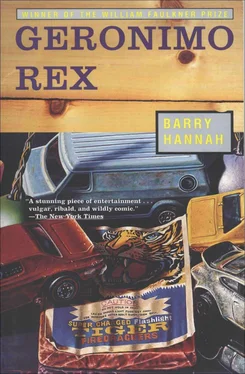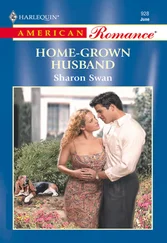One day Herdee wanted to sit by me in the cafeteria.
“Sorry, I’m waiting on my friends.”
“This table seats six. You have a lot of friends.”
“And all of them hate your guts.”
He sat down, with that same smile. He was uninsultable. One of the ways these sort of people make it is, they have absolutely no pride. Fleece came over with his tray and sat down.
“What’s the nerve gas doing to the dogs nowadays?” Fleece said. I really was interested in just how stupid Herdee was . I whispered so he could hear.
“You know well that this is a secret. We aren’t even supposed to know this is nerve gas. If the army heard me, they’d jerk my thirty-thousand-dollar grant right out from under me. Fleece, they really have something. As soon as I inject, they, their fur becomes gray, then white, then clear . In sixty seconds, the animal simply isn’t there . Only its functions are left behind. And the functions, per se , are tripled. A mound of dung two feet high appears within the hour; you can see the saliva dripping out by the pint, and every thirty minutes the unseen animal urinates, so the floor is a damned wading pool of moving liquids, and you smell rotten dog breath all in the air. I just sit there with my stopwatch and my pin, searching for the animal, who can not be found. Long hairs begin falling in the room on the flood and defecation. I’m still looking for a corpus . Eight hours after injection, this tiny, whimpering semblance of a dog appears, rubbing against my leg. He is wild with love. When I pick him up he hugs me with his paws around my neck. I take the dog down to the basement and put it in the hutch. When I come to see it the next morning, its little heart has burst.”
“Same as last week,” says Fleece, who sees that Herdee’s ear is driven toward me, and food parts are hanging on his nether lip.
I stare into my cigarette coal. “I think that is what Man is: a ghost with amplified functions , a body stolen away by its functions, and discovered at last as a tiny cur, crazed with impossible affections.”
“This man makes all of medicine his allegory, Herdee,” says Fleece.
“No. I think he’s actually brilliant at it. Unless he was quoting Shakespeare or somebody. You weren’t quoting Shakespeare, were you? You keep it up, Monroe. We need people like you too.”
“What do you mean, too ? Kiss my ass.”
A second goes by, then I pitch the live cigarette over the table into Herdee’s lap. He rears up bowlegged and swats himself about the crotch. “This is something you’d expect from a … a … a!” but he won’t finish. I’d love for him to tell me what I was. Yet he wouldn’t quit stuttering.
“Nobody likes a thug,” says Fleece, after Herdee has taken himself away. “That was a hell of a fine moral, but it was a stupid jerk-off story. Oh, it took in Herdee. It was worse than Edmund Spenser, for an allegory.”
“I didn’t ask you for literary criticism. I do all right on my own.” I got up and left to dump my tray, but I caught Fleece looking, well, concerned about me. I think he was still feeling guilty about having drawn me into med school, and I confess I played with this guilty concern the few times I saw him.
The lined record manuals that I used on the job were rather splendid little logs with pale green sheets, faint rosy lines, all bound in fake purple morocco leather. The pages yearned for a Harry who would raise his pen and come down with everything he’d always wanted to say. There were long vacant hours in the lab waiting on my dogs, hearing the eels slosh around in the tank across the way, where a team of two doctors from Chile and New Jersey were adding tiny solubles of this and that to see how the eels would take it. And I would write in the logs.
Fleece came down one afternoon when I was out for ping-pong in the basement. He was sitting on the stool reading the log, in my specially partitioned room which I was supposed to keep locked at all times, as the stipulation in the army grant said. I was working with the same #227 with the dogs, and the room was full of costly luxuries of research, like the five-hundred-dollar mixer, which was only a deluxe milkshake-making apparatus with a built-in heater to make solutions out of compounds that resisted being soluble, like #227. Fleece had a summer job in biochemistry, a couple of floors away, but I hadn’t seen him much since June.
“What’re these things on pages by themselves? Hey! These are poems , aren’t they?” I reached for the log. Fleece was overjoyed; he had a smile on, the size of his waist. ‘“This one is really creamy. Like ‘diamonds lying in gravy,’ huh? And this one is dirty , ha! Let me get on my muff-diver goggles. No, let me read it!” He turned a page. “An acrostic poem! A poem written in the shape of a trumpet! Gawd!”
This one did embarrass me. I tore the book away from him.
“What’s the army going to think about your poems? Some of them you’ve got written right in the middle of a report. I guess you’ll rip them out. Or you could just cross out the poems, or something. What are you going to do about them? — is what I mean. The ‘diamonds in gravy’ wasn’t bad.”
“You aren’t supposed to be in here.”
Fleece looked over at the black drugged dog in the corner. Dung and dried urine were all over the floor. “You want to go on observing what the nerve gas does to dogs for three more years, till you have the Ph.D.?”
“Hell, it’s fine with me. I don’t mind helping the army develop this. It’s better than shooting a man with a bullet They wake up alive … not a one of ‘em has died on me yet.”
“I’m not talking about the nerve gas. I mean you , do you want to sit here watching what it does for three years? I just don’t know, can hardly wonder, what a person like you would do with that Ph.D. in pharmacology when he got it.”
“I know one wonderful thing about it. The army won’t draft me into Vietnam while I’m here. If I get out I’m one-A.”
“You’d go if they drafted you?”
“Sure!” I said. That was in the days when I thought they were bringing in American soldiers to help shoot communist fanatics who were blowing up children on school buses and walking into harmless restaurants in Saigon with explosives strapped to their backs. I don’t mean the Viet Cong never did that. I mean that at the time, I thought that was all the war amounted to. My dream was that, if they got me to Saigon, even unwillingly, I would see some skinny bastard trying to place a bomb under a school bus full of children and be possessed with enough knowledge about my machine gun to sight on and scatter that champion all over South Vietnam; that the children in the bus, helpless darling little black eyes, would blow kisses to me, and I would show them the wizened smile of old democracy on the march, reloading. A simple dream, taken right out of the movies. But that’s what I had in my mind. One boy, Anderson, had been drafted right out of the pharmacology graduate program by the army; Anderson was slow, squat, and had bad vision. If they wanted him, I knew they were thinking about me. I’d thought about the draft a good bit.
“Monroe, you’ve got to get out of here. I know . There’s nothing here for you.”
I’d known that too, for three or four months. But it was hard to quit. Things were rather easy in the department. Everyone smiled at everyone, as a matter of form. We had thousands of dollars of equipment around us, and there was a technician, Jimmy, who could make any harebrained dream of an experiment into a reality — glycerinated guinea pig uterine fibers, chick embryos, damn the cost. There were two secretaries transmitting it all into publication, reading the earphones of the pocket-size tape recorders: “Caffeine on Rat Tongue” and “‘Retreating’ Magnesium in Rabbit Skeletal Muscle Suspensions Treated with Violin Lacquer.” It had all the hum of a factory, and I was sure I’d be cast out as a Ph.D. within the decade.
Читать дальше












